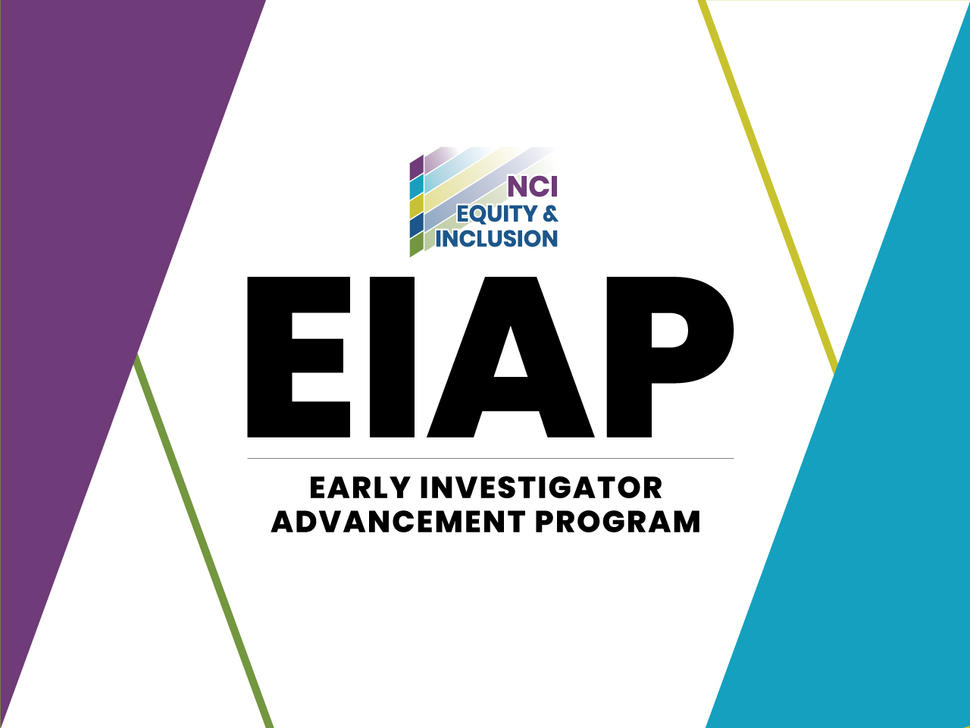Early Investigator Advancement Program Announces Third Cohort of Scholars
, by CRCHD Staff
Today, NCI is proud to announce the third cohort of EIAP Scholars!
The cancer research enterprise needs a continuous flow of talent through the research career pipeline to thrive. One critical juncture is the transition from junior investigator to established investigator. To this end, NCI launched the Early Investigator Advancement Program (EIAP) with the support of the NCI Equity Council in 2021. EIAP is a trans-NCI program that aims to assist cancer researchers and clinician scientists in attaining an R01 or R-type equivalent funding. We are pleased to announce and welcome the third cohort of EIAP scholars.
Prajakta Adsul, M.B.B.S., M.P.H., Ph.D., Assistant Professor, Department of Internal Medicine, and Member, Comprehensive Cancer Center, Cancer Control and Population Sciences Research Program, University of New Mexico
Doratha Byrd, Ph.D., M.P.H., Assistant Member in the Department of Cancer Epidemiology, Moffitt Cancer Center
Paul Castillo, M.D., Assistant Professor of Pediatrics and Physician-Scientist of the T Cell Engineering Laboratory of the Pediatric Cancer Immunotherapy Initiative (PCI2) and the Brain Tumor Immunotherapy Program (BTIP), University of Florida
Lakeshia Cousin, Ph.D., APRN, AGPCNP-BC, Assistant Professor, Family, Community and Health Systems Science, University of Florida
Chibawanye Ene, M.D., Ph.D., Assistant Professor and Physician-Scientist, Department of Neurosurgery, Division of Surgery, University of Texas MD Anderson Cancer Center
Aditi Hazra, Ph.D., M.P.H., Assistant Professor of Medicine, Harvard Medical School, and Associate Epidemiologist, Brigham and Women’s Hospital
Kimberly Hoang, M.D., Assistant Professor, Department of Neurosurgery, Emory University School of Medicine and Winship Cancer Institute
Judit Jimenez-Sainz, Ph.D., Assistant Professor, College of Medicine, Department of Biochemistry and Molecular Biology, Medical University of South Carolina
Aparna Kesarwala, M.D., Ph.D., Assistant Professor, Department of Radiation Oncology, Emory University School of Medicine and Winship Cancer Institute
Amber Kleckner, Ph.D., Assistant Professor, Pain and Translational Symptom Science, University of Maryland, Baltimore, School of Nursing
Stephanie Knollhoff, Ph.D., CCC-SLP, Assistant Professor, Director of Swallowing and Communication Physiology Exploration (SCoPE) Lab, University of Missouri
Diane E. Mahoney, Ph.D., D.N.P., FNP-BC, WHNP-BC, APRN, Assistant Professor, University of Kansas School of Nursing
Ricardo Iván Martínez Zamudio, Ph.D., Assistant Professor, Department of Pharmacology, Rutgers-Robert Wood Johnson Medical School
Bolni Nagalo, Ph.D., Assistant Professor, Experimental Pathology Division, University of Arkansas, College of Medicine
Ucheoma Nwaozuru, Ph.D., Assistant Professor, Implementation Science, Wake Forest University
Giselle Perez-Lougee, Ph.D., Associate Director, Adolescent and Young Adult Cancer Program, Director, Adolescent and Young Adult Research and the Mind Body Program for Cancer Survivors, Assistant Professor of Psychology, Harvard Medical School, Mass General Brigham
Katherine Ramos, Ph.D., Assistant Professor in Psychiatry and Behavioral Sciences, Assistant Professor of Medicine, Assistant Professor in Population Health Sciences, Senior Fellow, Center for the Study of Aging and Human Development, Member, Duke Cancer Institute, Duke University
Ameen Salahudeen, Ph.D., M.D., Clinical Assistant Professor, Department of Internal Medicine, College of Medicine, University of Illinois Cancer Center
Glenn Simmons, Ph.D., Assistant Professor, Department of Biomedical Sciences, Cornell University
Komal Singh, Ph.D., RN, Senior Associate Consultant and Assistant Professor of Nursing, Mayo Clinic
Ana Tergas, M.D., M.P.H., Assistant Professor, Division of Gynecologic Oncology, Department of Surgery, City of Hope Comprehensive Cancer Center
Michael A. Thomas, Ph.D., Associate Professor, Virology, Howard University
Suzanne Vang, Ph.D., Assistant Professor, Department of Population Health, New York University, Grossman School of Medicine
Enrique Israel Velazquez-Villarreal, M.D., Ph.D., M.P.H., M.S., Assistant Professor of Research Translational Genomics, City of Hope Comprehensive Cancer Center
Debra Yeboa, M.D., Associate Professor of the Department of Radiation Oncology, University of Texas MD Anderson Cancer Center
EIAP aims to:
- Enhance professional skills.
- Guide preparation of an R01 grant application.
- Provide access to a mentor and peer network.
- Grow a community of emerging independent investigators from diverse backgrounds.
Each year, EIAP supports the professional and career development of a diverse cohort of Early-Stage and New Investigators in cancer and cancer health disparities research who are preparing to submit a competitive R01 or R-type application by October/November of that year.
The program is designed to help participants develop competitive R01 applications while maintaining their clinical, laboratory, academic, and service responsibilities. So far, nine Scholars have obtained R01 or R-type funding through EIAP and non-EIAP applications. Additionally, two R21s and an R03 have been secured, with 11 applications currently under review and many more pending submission. Other accomplishments include receiving FDA clearance to continue a clinical trial, earning tenure promotions, receiving national recognition, and securing funding from private-sector and foundation sources.
In addition to these 25 Scholars, EIAP welcomes 32 EIAP Associates who will participate in several EIAP events, including a grant writing seminar and a mock review. These activities will be invaluable as the Associates develop their R01s for submission to NIH.
We are honored to welcome our new Scholars and Associates to EIAP!

























